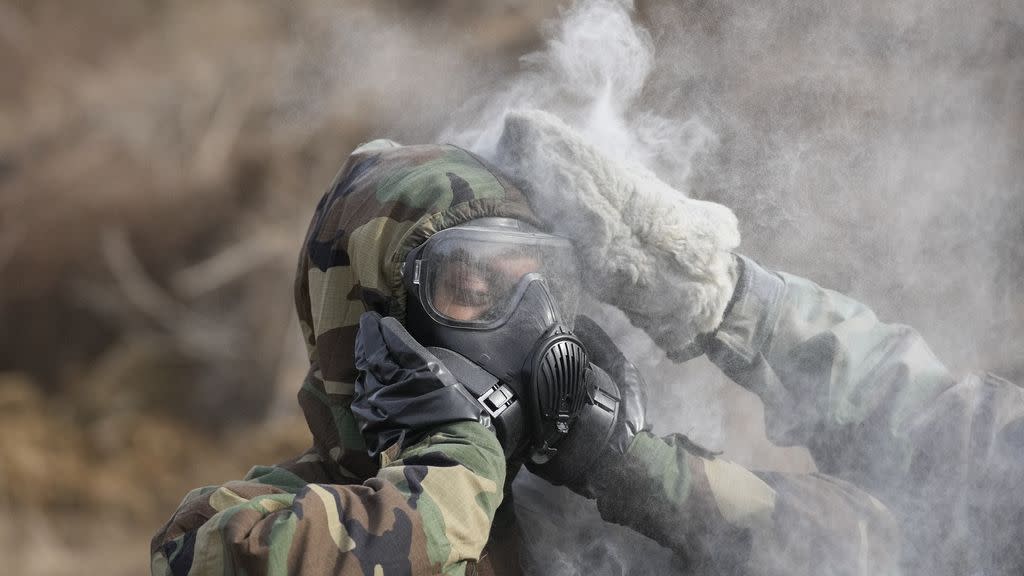Russia could step up chemical attacks in Ukraine, warns expert

An expert has warned Russia could use “horrific” chemical weapons in Ukraine, urging the international community to condemn their use.
The Kremlin says it does not have any intention to use chemical weapons.
On Sunday, Russia was accused of using phosphorus on the besieged city of Bakhmut, with Ukraine releasing footage purporting to show it raining down on its positions.
While phosphorus is not classified as a chemical weapon in international law, its use against civilian areas is considered a war crime under the Geneva Convention because of its "indiscriminate" and "traumatic effects".
Phosphorus creates flash fires that are incredibly hard to put out. If people are hit with the chemical they suffer horrendous burns, which actually accelerate if they come into contact with water.
It can, however, be legitimately used by military forces for night illumination and smoke screens.
Despite being an “absolutely horrific weapon”, Hamish de Bretton-Gordon, a British chemical weapons expert, says from a military perspective it can be “incredibly successful” on the battlefield.
“It was a favourite weapon of the Syrian regime,” he explained. “It was used to burn whole towns and villages in the northwest “like some sort of mediaeval scorched earth policy.”
White phosphorus bombs were allegedly used by Syrian government forces working alongside Russian General Sergei Surovikin, as part of Moscow’s 2015 military intervention to save the country's embattled leader Bashar al-Assad from rebels.
After commanding Russian forces in the Syrian Civil War, Surovikin, known as General Amaggedon, is now in charge of troops in Ukraine.
“What the Russians and the Syrians found is that you can fight conventionally in towns and cities, but you only get so far," de Bretton-Gordon told Euronews. "Once you reduce them to rubble, it's very difficult to dislodge your enemies. People can hide. But if you chuck in phosphorus it burns them out."
“That’s what we are seeing in Bakhmut,” he added.
Since August, Russian and Ukrainian forces have fought fiercely over the old salt mining town, which has been likened to a “meat grinder”. The fighting has inflicted heavy losses and depleted supplies on both sides, especially munitions.
“Nobody's got anywhere really,” said de Bretton-Gordon, adding phosphorus was likely being used out of “desperation”.
Phosphorus can also have a significant psychological impact on both troops and civilians, who often have little way of protecting themselves from horrific burns.
The US, UK and others have repeatedly raised fears Russia could use chemical weapons in Ukraine, especially in the immediate aftermath of its invasion last year.
So far, these worries have been unfounded. But de Bretton-Gordon had a warning for the future.
“When phosphorus didn't work, Assad went to chemical weapons and used chlorine and nerve agents,” he said. “[It was] almost the penultimate weapon that we saw in Syria. When it failed they went for chemical weapons.
"It is a possibility.”
Watchdog warns war in Ukraine greatly increases chemical weapons threat
Deployment of nuclear weapons in Belarus: Putin's veiled threat to Poland
Alleged white phosphorous attack by Russia on Ukrainian village in Kharkiv region
The former British Army officer and commander of the UK's Joint Chemical, Biological, Radiological and Nuclear Regiment claims Syrian government troops were able to break a four-year siege of Aleppo in 2016, thanks to chlorine barrel bombs.
Assad has repeatedly denied using chemical weapons against civilians in Syria, though international investigators have documented their use on several occasions.
While saying chemical weapons had not been deployed in Ukraine by Moscow, de Bretton-Gordon believed the world should not “bank on” the fact that this would also be so.
“The international community needs to reaffirm that any use of chemical or biological weapons would not be acceptable in any shape or form,” he added. “They must call the Russians out”.
“I'm sure NATO and the West would act if they [Russia] used chemical weapons in Ukraine. But having said that they stood by when Assad used such weapons in Syria and that might embolden Putin,” de Bretton-Gordon continued.
“I think some choice words from Biden and other world leaders at this moment might be helpful,” he added.
In March 2022, US President Joe Biden said NATO would respond if they were used, adding the “nature of the response would depend on the nature of the use.”
Russia is one of 193 countries that have signed up to the Chemical Weapons Convention, banning it from producing, stockpiling and using such weapons.
The Kremlin denies having chemical weapons. However, it used the deadly nerve agent novichok to poison opposition leader Alexei Navalny and political opponents in the UK, with some investigative journalists claiming it has a covert weapons programme.
Like many other countries, it also has large stockpiles of industrial chemicals, such as chlorine, that can be adapted for military use.
In December, Kyiv accused Russia of using a banned chemical weapon against its troops in eastern Ukraine.

 Yahoo News
Yahoo News 
